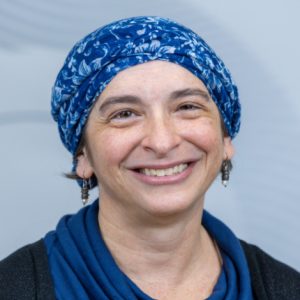Home » Programs » Full Degree Programs » Graduate » MA in Political Science – Track: Middle Eastern Religion and Politics
Home » Programs » Full Degree Programs » Graduate » MA in Political Science – Track: Middle Eastern Religion and Politics




Since the turn of the millennium, religious ideas and identities have increasingly shaped national and international politics, especially in the Middle East. This online MA program – led by Prof. Jonathan Fox, one of the world’s foremost experts in the field – provides a unique platform for understanding the role of religion in contemporary politics.
We explore the potential of religions to unite and divide societies, exacerbate conflict, or provide frameworks for peace. Whether you are planning a career in academia, policy research, diplomacy, conflict resolution, or the clergy, or whether you simply have a passion to understand the social forces that shape our world, this program is for you.
This two-year, online MA program will provide you with a deep academic grounding in religious and Middle Eastern politics as well as in general political science. The program is taught entirely in English by leading experts.
There are approximately six hours of online teaching each week, and the program is open to students anywhere in the world.
We consider both religious politics and Middle Eastern politics important topics of study within political science. This program uniquely combines these topics, which include a broad survey of Middle Eastern politics as well as religious politics both in the Middle East and outside of the Middle East. At the same time, we provide courses that cover basic political science theory and methodology. Thus, while this course of study has a unique focus, it will also provide a broad foundation in the general discipline of political science.
Bar-Ilan University’s Political Science Department is uniquely situated to provide this course of study. Its faculty is part of a 40+ year tradition of expertise and excellence in religious and Middle Eastern politics and includes world-class researchers and instructors on these topics. The department is also home to premier research centers and projects, which focus on these issues. These include the Religion and State Project, the Begin-Sadat Center for Strategic Studies, the Middle East’s premier national security think tank, and the Argov Center for the Study of Israel and the Jewish People. Read more about this degree in this article.

Track 1: Thesis Track
Track 2: Standard Track
Students on track 1 will take all required courses, two elective classes, and complete a MA thesis. Students on track 2 will take all required classes and four elective classes.
* = required class

Prof. Jonathan Fox is the Yehuda Avner Professor of Religion and Politics in Bar-Ilan University’s Political Studies Department and director of this MA program. He is also the director of the Religion and State Project (www.religionandstate.org,) which collects and analyzes data on government religion policy in 183 countries. He is among the world’s most prolific academic authors on religion and politics, and his work includes 14 books and nearly 100 academic articles on the topic. One of his books is the most widely used textbook on religion and politics: An Introduction to Religion and Politics, Theory and Practice (Routledge, 2018). These publications cover a wide variety of topics including religious conflict, government religion policy, religious minorities, and religion in international relations. His recent books include Thou Shalt Have No Other Gods Before Me: Why Governments Discriminate Against Religious Minorities (Cambridge University Press, 2020), Why Do People Discriminate Against Jews? (to be released by Oxford University Press in June 2021). Prof. Fox teaches the Introduction to Religion and Politics class in this program. Link to website: http://politics.biu.ac.il/en/node/978.
 Prof. Nahshon Perez is an associate professor in the Department of Political Studies at Bar-Ilan University. He has written extensively on religion and politics. His award-winning book (Best Book Award from the Israel Political Science Association, 2018) Women of the Wall: Navigating Religion in Sacred Sites (Oxford University Press, 2017) is the first book-length academic research to be published on this important dispute over prayer arrangements at the Western Wall, providing a detailed examination, including social, legal and Halachic (Jewish Law) aspects of the struggle of the Women of the Wall, and placing it in comparative and theoretical contexts. His book Governing the Sacred: Political Toleration in Five Contested Sacred Sites (Oxford University Press, 2020) defines and analyzes five governance models for contested sacred sites, corresponding to real life contested sites. It is the first research to offer such a systematic typology. His current book project Worldly Politics and Divine Institutions: a Casuistic Analysis of the Contemporary Entanglement of Faith and Government examines complex cases of entanglement of government and religion, including cases of discrimination conducted by governmental-funded religious associations; the governmental endorsement of religious symbols in public spaces, and others. Prof. Perez teaches the Religion in Contemporary Political Theory class in this program. Link to website: http://politics.biu.ac.il/en/node/763.
Prof. Nahshon Perez is an associate professor in the Department of Political Studies at Bar-Ilan University. He has written extensively on religion and politics. His award-winning book (Best Book Award from the Israel Political Science Association, 2018) Women of the Wall: Navigating Religion in Sacred Sites (Oxford University Press, 2017) is the first book-length academic research to be published on this important dispute over prayer arrangements at the Western Wall, providing a detailed examination, including social, legal and Halachic (Jewish Law) aspects of the struggle of the Women of the Wall, and placing it in comparative and theoretical contexts. His book Governing the Sacred: Political Toleration in Five Contested Sacred Sites (Oxford University Press, 2020) defines and analyzes five governance models for contested sacred sites, corresponding to real life contested sites. It is the first research to offer such a systematic typology. His current book project Worldly Politics and Divine Institutions: a Casuistic Analysis of the Contemporary Entanglement of Faith and Government examines complex cases of entanglement of government and religion, including cases of discrimination conducted by governmental-funded religious associations; the governmental endorsement of religious symbols in public spaces, and others. Prof. Perez teaches the Religion in Contemporary Political Theory class in this program. Link to website: http://politics.biu.ac.il/en/node/763.
 Prof. Elisheva Rosman Stollman is an associate professor in the Department of Political Studies at Bar-Ilan University. She writes on a range of issues in Israeli, Middle Eastern, military, and religious politics. Her research focuses on the relationship between the military and religious soldiers including student soldiers and religious soldiers, and the media image of the Israeli soldier. This includes her book For God and Country? Religious Student-Soldiers in the Israel Defense Forces, (University of Texas Press and the Center for Middle Eastern Studies, 2014). Her current research focuses on religious women in the military, religious feminism, and civilian medicine and the military. She has also received multiple awards for outstanding teaching. Prof. Rosman Stollman teaches the Civil-Military Relations in Israel: Theory and Practice seminar in this program. Link to website: http://politics.biu.ac.il/en/node/596.
Prof. Elisheva Rosman Stollman is an associate professor in the Department of Political Studies at Bar-Ilan University. She writes on a range of issues in Israeli, Middle Eastern, military, and religious politics. Her research focuses on the relationship between the military and religious soldiers including student soldiers and religious soldiers, and the media image of the Israeli soldier. This includes her book For God and Country? Religious Student-Soldiers in the Israel Defense Forces, (University of Texas Press and the Center for Middle Eastern Studies, 2014). Her current research focuses on religious women in the military, religious feminism, and civilian medicine and the military. She has also received multiple awards for outstanding teaching. Prof. Rosman Stollman teaches the Civil-Military Relations in Israel: Theory and Practice seminar in this program. Link to website: http://politics.biu.ac.il/en/node/596.
 Dr. Meirav Mishali-Ram is a senior lecturer in the Department of Political Studies at Bar-Ilan University. She has a wide variety of research interests including conflict, civil war, the Middle East, and South Asian studies. Her recent book Conflict Change and Persistence: The India-Pakistan and Arab-Israeli Conflicts Compared combines all of these topics and examines two of the most intractable rivalries in current world politics, focusing on transformation processes in the two rivalries, embodied in the characteristics of actors, discourses and conflictual expressions over time. Other recent work focuses on the question of what attracts Muslim foreign fighters to participate in conflicts in the Middle East. Dr. Mishali-Ram teaches the Approaches and Theories in Political Science class in this program. Link to website: http://politics.biu.ac.il/en/node/582.
Dr. Meirav Mishali-Ram is a senior lecturer in the Department of Political Studies at Bar-Ilan University. She has a wide variety of research interests including conflict, civil war, the Middle East, and South Asian studies. Her recent book Conflict Change and Persistence: The India-Pakistan and Arab-Israeli Conflicts Compared combines all of these topics and examines two of the most intractable rivalries in current world politics, focusing on transformation processes in the two rivalries, embodied in the characteristics of actors, discourses and conflictual expressions over time. Other recent work focuses on the question of what attracts Muslim foreign fighters to participate in conflicts in the Middle East. Dr. Mishali-Ram teaches the Approaches and Theories in Political Science class in this program. Link to website: http://politics.biu.ac.il/en/node/582.
 Dr. Ariel Zellman (PhD Northwestern University) is a lecturer in the Department of Political Studies at Bar-Ilan University. He researches a wide variety of topics including national identity and conflict in the Middle East and the former Yugoslavia, white nationalism and American Congressional politics, and the role of religion in international and intrastate conflict. He has published in top-tier journals including the Journal of Peace Research, East European Politics, Politics and Religion, Security Studies, and Territory Politics Governance. His current major projects include the longitudinal study of the influence of religion-state policy on international territorial conflict from 1816-2001 with Dr. Davis Brown, the role of sacred sites in interstate dispute militarization in the post-Cold War era with Professor Jonathan Fox, and a book manuscript examining the impact of governmental and societal discrimination on protest and insurgent mobilization by religious minority groups from 2000-2015 with Professors Jonathan Fox and Matthias Basedau. Dr. Zellman teaches the Qualitative and Quantitative Research Methods in Political Science course in this program. Link to website: http://politics.biu.ac.il/en/node/902.
Dr. Ariel Zellman (PhD Northwestern University) is a lecturer in the Department of Political Studies at Bar-Ilan University. He researches a wide variety of topics including national identity and conflict in the Middle East and the former Yugoslavia, white nationalism and American Congressional politics, and the role of religion in international and intrastate conflict. He has published in top-tier journals including the Journal of Peace Research, East European Politics, Politics and Religion, Security Studies, and Territory Politics Governance. His current major projects include the longitudinal study of the influence of religion-state policy on international territorial conflict from 1816-2001 with Dr. Davis Brown, the role of sacred sites in interstate dispute militarization in the post-Cold War era with Professor Jonathan Fox, and a book manuscript examining the impact of governmental and societal discrimination on protest and insurgent mobilization by religious minority groups from 2000-2015 with Professors Jonathan Fox and Matthias Basedau. Dr. Zellman teaches the Qualitative and Quantitative Research Methods in Political Science course in this program. Link to website: http://politics.biu.ac.il/en/node/902.
 Dr. Julia Elad-Strenger is a political psychologist studying the psycho-social processes that shape citizens’ political attitudes and partisan and ideological identities. Her studies focus primarily on citizens’ attitudes in the context of conflict, in particular the factors that shape their support for violence and discrimination towards national out-groups and minorities. Her studies employ a wide range of quantitative methodologies, including experiments, panel studies and large-N surveys, and focus primarily on the Middle-Eastern and Western-European contexts. Dr. Elad-Strenger teaches the Introduction to Political Science Research Methods class in this program. Link to website: http://politics.biu.ac.il/en/node/1242.
Dr. Julia Elad-Strenger is a political psychologist studying the psycho-social processes that shape citizens’ political attitudes and partisan and ideological identities. Her studies focus primarily on citizens’ attitudes in the context of conflict, in particular the factors that shape their support for violence and discrimination towards national out-groups and minorities. Her studies employ a wide range of quantitative methodologies, including experiments, panel studies and large-N surveys, and focus primarily on the Middle-Eastern and Western-European contexts. Dr. Elad-Strenger teaches the Introduction to Political Science Research Methods class in this program. Link to website: http://politics.biu.ac.il/en/node/1242.
Apart from the curriculum, every student must study: One Judaism/General course if they are a Bar-Ilan University graduate, and 2 Judaism courses or general courses if they are not a university graduate.
 Dr. Zisenwine is a research fellow at the Truman Institute-Hebrew University, and a guest lecturer at the Departments of Near Eastern and Jewish Studies at the University of Base in Switzerland. Dr. Zisenwine’s research focuses on modern North African history and the British mandate in Palestine. His current research projects include a study of Tunisia’s post-revolution transitional justice process, and a book on the history of the Ben ‘Ali regime in Tunisia (forthcoming, I.B.Tauris). Dr. Zisenwine has taught courses on the Modern Middle East and North Africa at Tel Aviv University, The United States Naval Academy, and Georgetown Univerity.
Dr. Zisenwine is a research fellow at the Truman Institute-Hebrew University, and a guest lecturer at the Departments of Near Eastern and Jewish Studies at the University of Base in Switzerland. Dr. Zisenwine’s research focuses on modern North African history and the British mandate in Palestine. His current research projects include a study of Tunisia’s post-revolution transitional justice process, and a book on the history of the Ben ‘Ali regime in Tunisia (forthcoming, I.B.Tauris). Dr. Zisenwine has taught courses on the Modern Middle East and North Africa at Tel Aviv University, The United States Naval Academy, and Georgetown Univerity.
 Dr. Benjamin Schvarcz is an Assistant Professor at Bar-Ilan University’s Department of Political Studies. He has recently completed two years of Postdoctoral Research Fellowship at Princeton University. He is specializing in Jewish Political Thought in two historical contexts: Ancient rabbinic literature and the modern State of Israel. His articles were published in journals such as Politics and Religion, Harvard Theological Review and Jewish Quarterly Review.
Dr. Benjamin Schvarcz is an Assistant Professor at Bar-Ilan University’s Department of Political Studies. He has recently completed two years of Postdoctoral Research Fellowship at Princeton University. He is specializing in Jewish Political Thought in two historical contexts: Ancient rabbinic literature and the modern State of Israel. His articles were published in journals such as Politics and Religion, Harvard Theological Review and Jewish Quarterly Review.
 Dr. Ben Mollov is on the faculty of the Interdisciplinary Department of Social Sciences and the Graduate Program in Conflict Management at Bar-Ilan University, and runs the university’s Project for the Study of Religion, Culture and Peace. He specializes in conflict management from an intercultural perspective and the Jewish political tradition, on which he has written widely. He is the author of Power and Transcendence: Hans J. Morgenthau and the Jewish Experience (2001) and other articles such as “Culture, Dialogue and Perception Change in the Israeli-Palestinian Conflict” with Dr. Chaim Lavie, and “Federalism and Multiculturalism as a Vehicle for Perception Change in Israeli-Jewish Society” with Dr. Zev Kalifon, both of which appeared in The International Journal of Conflict Management. He has organized several international conferences at Bar-Ilan University in cooperation with the Konrad Adenauer Foundation and appeared as the sole Israeli speaker at the Global Peace Forum in Kuala Lumpur, Malaysia in 2005, and appeared again for another guest lecture in Malaysia in 2008.
Dr. Ben Mollov is on the faculty of the Interdisciplinary Department of Social Sciences and the Graduate Program in Conflict Management at Bar-Ilan University, and runs the university’s Project for the Study of Religion, Culture and Peace. He specializes in conflict management from an intercultural perspective and the Jewish political tradition, on which he has written widely. He is the author of Power and Transcendence: Hans J. Morgenthau and the Jewish Experience (2001) and other articles such as “Culture, Dialogue and Perception Change in the Israeli-Palestinian Conflict” with Dr. Chaim Lavie, and “Federalism and Multiculturalism as a Vehicle for Perception Change in Israeli-Jewish Society” with Dr. Zev Kalifon, both of which appeared in The International Journal of Conflict Management. He has organized several international conferences at Bar-Ilan University in cooperation with the Konrad Adenauer Foundation and appeared as the sole Israeli speaker at the Global Peace Forum in Kuala Lumpur, Malaysia in 2005, and appeared again for another guest lecture in Malaysia in 2008.
For more information contact us: [email protected]
Please check the information in the program’s brochure
Leave your details and we’ll get back to you soon
Explore a range of undergraduate degrees in English, including Political Science, Communication, and Humanities. We also offer 16 diverse graduate programs and a brand-new Cyber Security & Data Protection certificate – all in English!

If you find an error in content or missing information – please update us. In any case, the binding information appears on the website of the Council for Higher Education.
We firmly believe that the internet should be available and accessible to anyone, and are committed to providing a website that is accessible to the widest possible audience, regardless of circumstance and ability.
To fulfill this, we aim to adhere as strictly as possible to the World Wide Web Consortium’s (W3C) Web Content Accessibility Guidelines 2.1 (WCAG 2.1) at the AA level. These guidelines explain how to make web content accessible to people with a wide array of disabilities. Complying with those guidelines helps us ensure that the website is accessible to all people: blind people, people with motor impairments, visual impairment, cognitive disabilities, and more.
This website utilizes various technologies that are meant to make it as accessible as possible at all times. We utilize an accessibility interface that allows persons with specific disabilities to adjust the website’s UI (user interface) and design it to their personal needs.
Additionally, the website utilizes an AI-based application that runs in the background and optimizes its accessibility level constantly. This application remediates the website’s HTML, adapts Its functionality and behavior for screen-readers used by the blind users, and for keyboard functions used by individuals with motor impairments.
If you’ve found a malfunction or have ideas for improvement, we’ll be happy to hear from you. You can reach out to the website’s operators by using the following email
Our website implements the ARIA attributes (Accessible Rich Internet Applications) technique, alongside various different behavioral changes, to ensure blind users visiting with screen-readers are able to read, comprehend, and enjoy the website’s functions. As soon as a user with a screen-reader enters your site, they immediately receive a prompt to enter the Screen-Reader Profile so they can browse and operate your site effectively. Here’s how our website covers some of the most important screen-reader requirements, alongside console screenshots of code examples:
Screen-reader optimization: we run a background process that learns the website’s components from top to bottom, to ensure ongoing compliance even when updating the website. In this process, we provide screen-readers with meaningful data using the ARIA set of attributes. For example, we provide accurate form labels; descriptions for actionable icons (social media icons, search icons, cart icons, etc.); validation guidance for form inputs; element roles such as buttons, menus, modal dialogues (popups), and others. Additionally, the background process scans all of the website’s images and provides an accurate and meaningful image-object-recognition-based description as an ALT (alternate text) tag for images that are not described. It will also extract texts that are embedded within the image, using an OCR (optical character recognition) technology. To turn on screen-reader adjustments at any time, users need only to press the Alt+1 keyboard combination. Screen-reader users also get automatic announcements to turn the Screen-reader mode on as soon as they enter the website.
These adjustments are compatible with all popular screen readers, including JAWS and NVDA.
Keyboard navigation optimization: The background process also adjusts the website’s HTML, and adds various behaviors using JavaScript code to make the website operable by the keyboard. This includes the ability to navigate the website using the Tab and Shift+Tab keys, operate dropdowns with the arrow keys, close them with Esc, trigger buttons and links using the Enter key, navigate between radio and checkbox elements using the arrow keys, and fill them in with the Spacebar or Enter key.Additionally, keyboard users will find quick-navigation and content-skip menus, available at any time by clicking Alt+1, or as the first elements of the site while navigating with the keyboard. The background process also handles triggered popups by moving the keyboard focus towards them as soon as they appear, and not allow the focus drift outside of it.
Users can also use shortcuts such as “M” (menus), “H” (headings), “F” (forms), “B” (buttons), and “G” (graphics) to jump to specific elements.
We aim to support the widest array of browsers and assistive technologies as possible, so our users can choose the best fitting tools for them, with as few limitations as possible. Therefore, we have worked very hard to be able to support all major systems that comprise over 95% of the user market share including Google Chrome, Mozilla Firefox, Apple Safari, Opera and Microsoft Edge, JAWS and NVDA (screen readers), both for Windows and for MAC users.
Despite our very best efforts to allow anybody to adjust the website to their needs, there may still be pages or sections that are not fully accessible, are in the process of becoming accessible, or are lacking an adequate technological solution to make them accessible. Still, we are continually improving our accessibility, adding, updating and improving its options and features, and developing and adopting new technologies. All this is meant to reach the optimal level of accessibility, following technological advancements. For any assistance, please reach out to